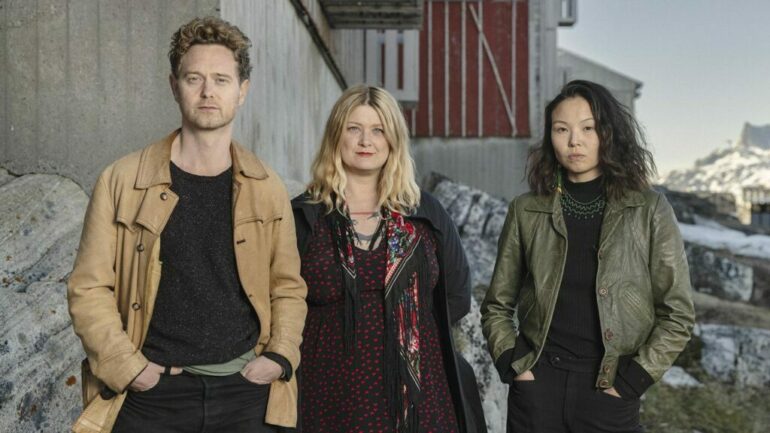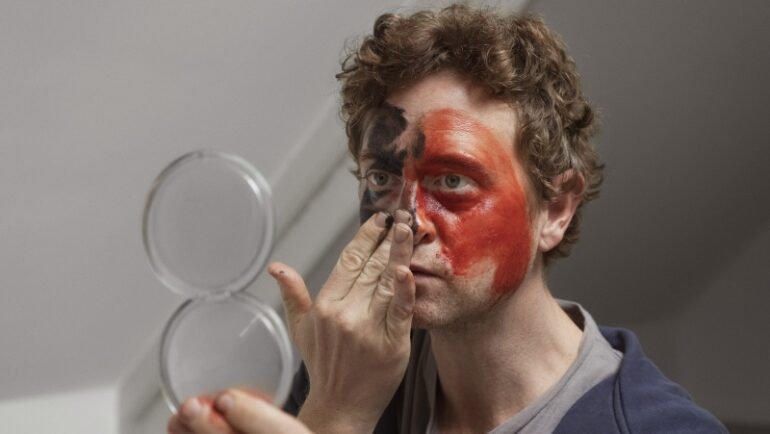WRITTEN BY: Annika Pham
The Danish feature drama produced by Manna Film with support from Nordisk Film & TV Fond is having its world premiere September 23 in San Sebastian’s main competition.
Swedish-born Eklöf ‘s distinctive filmmaking voice was discovered with her multi-awarded debut film Holiday. She was also co-writer of Ali Abbasi’s genre-bending Border.
Her sophomore feature Kalak is based on author Kim Leine’s 2007 autobiographical eponymous novel, adapted for the screen by Leine and Sissel Dalsgaard Thomsen.
The main character Jan is on the run from himself, after being sexually abused by his father. Living in Greenland with his little family, he yearns to be a part of the open, collectivist culture.
In the title roles are Emil Johnsen (All the Beauty, Guidance) as Jan, Asta Kamma August (Burn all My Letters, The Pact) as his wife, and Søren Hellerup as his father. The main Greenlandic roles are played by film director Berda Larsen, Connie Kristoffersen and Hans-Jukku Noahsen.
The film was produced by Maria Møller Kjeldgaard for Manna Film, in co-production with Sweden’s Momento Film, Film i Väst, Norway’s Mer Film, Holland’s Lemming Film, Finland’s Made, Polarama Greenland and Denmark’s Beofilm. Scanbox will handle the domestic release March 3rd, 2024. Totem Films is in charge of world sales.
What was your reaction when you first read Kim Leine’s novel? What triggered your desire to adapt it for the screen and how did you personally connect with the story?
Isabella Eklöf: It’s a biography, so it’s a bit chaotic, and it spreads over many years. But what makes it strong is the combined story of Jan who runs away from his past and sexually abusive father in Denmark and his eagerness to join a collective culture in Greenland.
A lot of the book is also about drug abuse but it is a consequence of his traumatic relationship with his father and I didn’t want to focus too much on that. Shedding a light on an abusive relationship is more interesting to me than substance abuse. My own father was a kind of sociopath. I had to learn to deal with it. You can’t just run away.
Was it obvious that Kim Leine would part of the film adaptation?
IE: Absolutely. I worked the same way with Holiday. It was loosely based on a book and we ended up not using much from that source material. But it started in a similar way. My idea here was to use a concept, find someone who had a story that I could connect with but at the same time took place in a world that I wasn’t familiar with. We decided therefore to collaborate. A lot of scenes are from the book, and others are new stuff that Kim wrote for me. For instance - I would ask him - if you went to the market to buy some meat-how would it look like? Kim is a super intense writer who produces quickly.
Greenland is rarely portrayed in fiction films. Did you feel a responsibility to draw a true and authentic portrait that wouldn’t be stereotyped?
IE: Yes of course. It’s important to go beyond the usual images you get in the media. But the book does that already. The main character Jan tries to get Greenlandic culture under his skin. We also had to do extensive research in Greenland before we started filming. The story takes place around the year 2000. But how Greenland is today obviously matters. There is a strong political movement pro-independence and a new generation who doesn’t give a f..k about Denmark and doesn’t care about learning Danish. They speak English and don’t have to go through Denmark to feel like global citizens.
Jan has a complex relationship with Greenland - he wants to be part of it but brings chaos at the same time. And he doesn’t mind being called a ‘Kalak’ or ‘dirty greenlander’.
IE: Exactly. He’s not a healthy person and will have toxic relationships until he is able to deal with his trauma. What he looks for is validation from people who also are experiencing trauma. He finds this in the bars where people are broken. But it doesn’t mean that they can fix each other. He still has to go a long way to rebuild himself.
Would you say that the film really is about the need for reconciliation to rebuild on a personal and collective level?
IE: Yes. One of the things that makes the book so interesting is that the relationship between Jan and his father mirrors the relationship between Greenland and Denmark. There is a paternalistic, overbearing macho post-colonial attitude of Denmark versus Greenland.
Just like in Holiday, you’re not afraid to depict a graphic sex scene - here at the beginning of the film -, which immediately sets the tone. Could you expand on this choice?
IE: Yes. The only explicit sex scene in the film is at the beginning. It was important for me to show it to make people understand Jan’s trauma and where it comes from. Sometimes people have a romanticised, cliché idea of what sexual abuse looks like, whether its female or male abuse. We wanted to show the complexity of it - how shame is often internalised - in men as much as in women.
Emil Johnsen isn’t that established internationally but his performance as Jan is astounding…
IE: Well he has done a lot of theatre. He was wonderful to work with and there is something in him that is very special. He is boyish, frail and strong at the same time.
WATCH THE TRAILER
Asta Kamma August who plays his wife had little dialogue. It was a subtle role to interpret…
IE: Yes she plays a complex character. She is someone who probably has dealt with trauma but deals with it silently, dignity. She just copes, keeps going. That said, she is a strong character.
I needed a professional actor to portray this with nuance.
Can you discuss your documentary style of filmmaking, mixing professional actors and amateurs?
IE: I love the documentary approach. Working with amateurs brings so much. All of the Greenlandic amateurs improvised their lines and brought authenticity beyond what was written. Some of the scenes were just about inviting the villagers, and capturing it on camera.
How challenging was filming in Greenland, in Nuuk and Kulusuk?
IE: We were there over two months-with two shooting periods in the two cities. Weather conditions were super challenging but I loved the people and the food. Kulusuk was very remote. We had to work with the few villagers who were willing to make extra money.
Ultimately what do you hope the audience will take away from watching the film?
IE: I like that people take away what they want to take away. But of course, it is about tolerance, acceptance. The film does celebrate Greenland. We humans aren’t that different around the world.
Will the film be released in Greenland?
IE: Absolutely. We have a premiere in March in Denmark, then it will be shown in Nuuk right after, then in the rest of the Nordics.
What’s next?
IE: I’d like to make a film in Stockholm, about a true murder that happened in a wealthy family in 1932. I’ve been fascinated by that story for a while.

